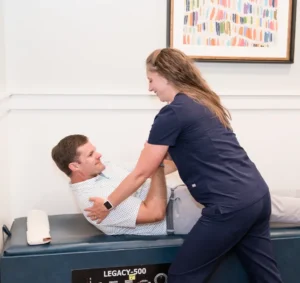
What Are Radicular Symptoms?
After a car accident, many people expect to feel sore. But if you’re experiencing sharp, shooting pain that travels down your arm or leg—or if you have tingling, numbness, or muscle weakness—you may be dealing with radicular symptoms.
Radicular pain happens when a nerve root in the spine becomes compressed or irritated. This is often the result of disc injuries, facet joint problems, or inflammation caused by trauma from the crash.
At Keystone Medical Group, we specialize in diagnosing and treating these types of injuries, helping accident victims get back to a pain-free life.
What Causes Radicular Symptoms After an Accident?
During a collision, the sudden force can compress or stretch the spine. Even if you didn’t hit your head or lose consciousness, the impact alone can damage soft tissue and shift spinal structures. As a result, a nerve can become pinched or inflamed.
Common causes of post-crash radicular symptoms include:
-
Herniated or bulging discs pressing on nerves
-
Swelling or inflammation around nerve roots
-
Bone or joint misalignment in the spine
-
Scar tissue developing near nerve pathways
These issues don’t always show up on standard X-rays, which is why advanced diagnostics are so important.
Symptoms You Shouldn’t Ignore
Radicular symptoms vary depending on where the nerve irritation is happening—neck (cervical), mid-back (thoracic), or lower back (lumbar). Common complaints include:
-
Shooting pain down the arm or leg
-
Numbness or tingling in the hands, fingers, feet, or toes
-
Burning sensations that don’t go away
-
Muscle weakness or coordination issues
If you notice any of these symptoms after an accident, it’s time to get evaluated.
How Keystone Medical Group Can Help
At Keystone Medical Group, we take a comprehensive approach to diagnosing and treating radicular pain. First, we perform a detailed physical exam and use advanced tools like:
-
MRI and DTI imaging to see soft tissue and nerve damage
-
Electrodiagnostic testing (EMG/NCV) to measure nerve function
-
Neurologic exams to pinpoint the affected nerve root
Once we identify the source of your symptoms, we’ll create a treatment plan that works for you.
Treatment Options for Radicular Pain
Most patients don’t need surgery. Instead, our care team focuses on non-invasive, targeted treatments such as:
-
Spinal decompression therapy
-
Epidural steroid injections to reduce nerve inflammation
-
Physical therapy to improve mobility and posture
-
Pain management strategies tailored to your condition
-
Chiropractic or manual therapy when appropriate
Our goal is to reduce pressure on the nerve, relieve your symptoms, and help you avoid long-term complications.
Serving Kansas City and Surrounding Areas
We treat patients from Kansas City, Overland Park, Lee’s Summit, Independence, Raytown, and beyond. If you’ve been in an accident and are feeling nerve pain, you don’t need to suffer in silence—or drive all over town for answers.
At Keystone Medical Group, everything you need is in one place.
Call Today to Get Relief From Nerve Pain
If you’ve been in a crash and are dealing with radiating pain, numbness, or tingling, don’t wait. These symptoms could be signs of a serious injury, and early treatment is the key to a full recovery.
Call Keystone Medical Group at 816-705-2842 today to schedule your evaluation. Let us help you heal safely and completely.









